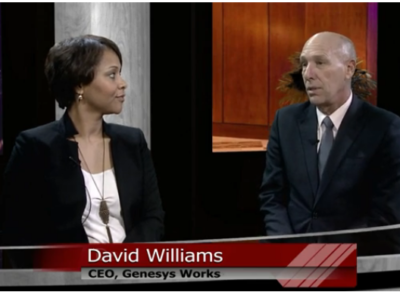Genesys Works with Mioshi Moses and David Williams
(May 1, 2019) Catherine Read interviews Mioshi Moses, Executive Director of the National Capital Region and David Williams, CEO of Genesys Works. They empower high school students from challenged backgrounds to achieve college and career success through skills training and meaningful work experience.
Founded in 2002 by Rafael Alvarez in Houston, TX, Genesys Works came to life when he served on the board of a local charter school and was struck by the bleak prospects economically challenged students faced, at a time when companies like his were in need of new sources of talent. His goal was to think outside the box and create a meaningful program to help students thrive. Starting with 10 students, he developed an intern-based program that is a unique fusion of training, mentoring and professional experience.
Students who would otherwise not have access to professional experience opportunities are selected to apply to the program. It is a rigorous application process because they want to be sure that the students are 100% committed to sticking with the program. The students then spend the summer of their junior year in an intensive 8-week training program, designed to teach them both the technical skills they would need in an office, as well as the soft skills that they need to succeed.
Once senior year rolls around, the students have condensed classes in the morning to cover academics, then go on to work for 5 hours in a professional setting. This is a demanding program that expects the students to be able to stay on top of their academics, while balancing it with their internship. In order to help each student succeed in their new professional environment, they are assigned a job coach to work with over the course of the year. This is someone who they can call on for advice on how to handle situations and challenges regarding their day-to-day duties.

To date, 100 percent of the students who have participated in the program have graduated from high school, and 93 percent of them have gone onto college. The program’s goal is to move more students out of poverty and into professional careers, creating a more productive and diverse workforce in the process. By giving underserved students the opportunity to succeed in a professional work environment while still in high school, they can open up career possibilities and pathways previously thought unattainable.
Moses runs the local chapter of the group here in the National Capital Region, and is excited about the prospect of exposing students to public sector jobs through opportunities with government agencies at the Federal, State and Local levels. They already have a program established with Fairfax County Government and Fairfax County Public Schools, and she is looking to grow those opportunities and add more partnerships over time. In order to accomplish this goal, Gensys Works is looking to grow their name recognition and increase philanthropic giving to support their mission and serve more students in need.
Moses shares that they were awarded two significant grants this year. One from the Jack Kent Cook Foundation, for $120,000 over 2 years, and the other from the Clark Foundation, for $1 million over a 3-year period. CEO David Williams, who took his post in January of 2019, is looking to grow the program exponentially during his tenure. Although the program has only been rolled out in larger metropolitan areas to date, Williams believes that this program can succeed anywhere. They are looking to grow their geographic footprint in order to serve the needs of more students, companies and communities across the country.